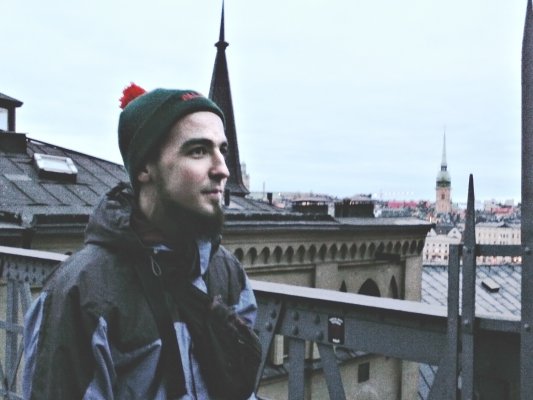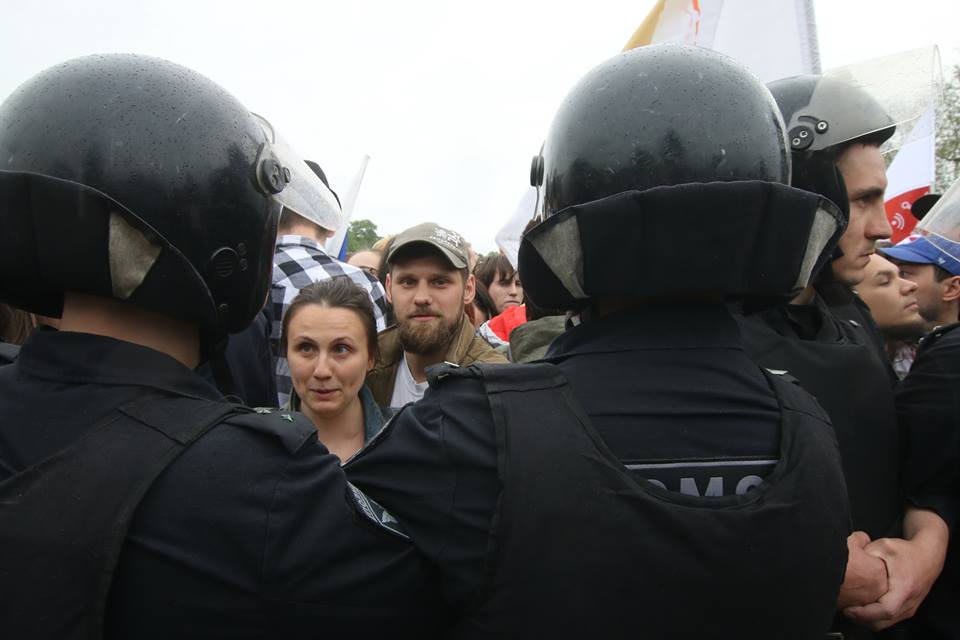 Amnesty International, the world’s premier human rights organization, thinks there is a chance Network case suspect Yuli Boyarshinov (pictured here) and his ten comrades can get a fair trial in Russia, which has a 99% conviction rate. Photo courtesy of Rupression
Amnesty International, the world’s premier human rights organization, thinks there is a chance Network case suspect Yuli Boyarshinov (pictured here) and his ten comrades can get a fair trial in Russia, which has a 99% conviction rate. Photo courtesy of Rupression
Despite what I wrote to a comrade yesterday, it turns out Amnesty International did issue a report on the Network case—just as last year was ending, meaning well over a year since the ugly, insulting mess kicked off in Penza.
But you might wish Amnesty International had not bothered to write anything, especially after you read the report’s conclusion.
If the suspects in the sickening torture carnival and flagrant frame-up known as the Network case go to trial, there is a 99% chance that, as in the recent case of two other well-known convicted “terrorists,” Oleg Sentsov and Alexander Kolchenko, the Networkers will be tried in closed chambers by a military tribunal in a city like Rostov-on-Don, which has the added advantage of being quite far from the Networkers’ homes in Penza and Petersburg, making it extraordinarily difficult for their family and friends to make the trip so they can, at best, stand in the hallway of the courthouse or outside it and, perhaps, every once in a while catch a glimpse of their loved ones as they are shuttled back and forth between hearings by heavily armed bailiffs and guard dogs.
Correspondingly, the Networkers will be found guilty on all charges and sentenced to hefty terms in prison like Kolchenko and Sentsov, who were just as obviously the victims of a blatant frame-up, meant to teach Crimeans and the world a brutal lesson about the new bosses in the Crimean Peninsula.
Given these circumstances, what prevented Amnesty International from declaring the Networkers prisoners of conscience and turning their case into a full-fledged international solidarity campaign is beyond me.
Amnesty International must think there is a chance the Networkers are “real” terrorists, meaning the world’s greatest human rights advocates have become either hopelessly naive in their late middle age or abysmally cynical. {TRR}
Thanks to Comrade Koganzon for finding AI’s dismal report.
______________________________________
What can you do to support the Penza and Petersburg antifascists and anarchists who have been tortured and imprisoned by the Russian Federal Security Service (FSB)?
- If you are in London or can get to London on January 19, join the solidarity demo at the Cable Street Mural at 2 p.m. The demonstration is supported by Anarchist Communist Group, Anarchist Federation, Brighton Antifascists, Bristol Anti-Fascists, Brazilian Women against Fascism, Feminist Fightback, London Antifascists, London Anarchist Black Cross, North London Anti-Fascists, Plan C LDN, RS21, and Labour Briefing. Please email london19jan(at)riseup.net to add your organization to the list of supporters. More information about the Cable Street Mural and its location can be found on its Facebook page.
- Donate money to the Anarchist Black Cross via PayPal (abc-msk@riseup.net). Make sure to specify your donation is earmarked for “Rupression.”
- Spread the word about the Network Case aka the Penza-Petersburg “terrorism” case. You can find more information about the case and in-depth articles translated into English on this website (see below), rupression.com, and openDemocracyRussia.
- Organize solidarity events where you live to raise money and publicize the plight of the tortured Penza and Petersburg antifascists. Go to the website It’s Going Down to find printable posters and flyers you can download. You can also read more about the case there.
- If you have the time and means to design, produce, and sell solidarity merchandise, please write to rupression@protonmail.com.
- Write letters and postcards to the prisoners. Letters and postcards must be written in Russian or translated into Russian. You can find the addresses of the prisoners here.
- Design a solidarity postcard that can be printed and used by others to send messages of support to the prisoners. Send your ideas to rupression@protonmail.com.
- Write letters of support to the prisoners’ loved ones via rupression@protonmail.com.
- Translate the articles and information at rupression.com and this website into languages other than Russian and English, and publish your translations on social media and your own websites and blogs.
- If you know someone famous, ask them to record a solidarity video, write an op-ed piece for a mainstream newspaper or write letters to the prisoners.
- If you know someone who is a print, internet, TV or radio journalist, encourage them to write an article or broadcast a report about the case. Write to rupression@protonmail.com or the email listed on this website, and we will be happy to arrange interviews and provide additional information.
- It is extremely important this case break into the mainstream media both in Russia and abroad. Despite their apparent brashness, the FSB and their ilk do not like publicity. The more publicity the case receives, the safer our comrades will be in remand prison from violence at the hands of prison stooges and torture at the hands of the FSB, and the more likely the Russian authorities will be to drop the case altogether or release the defendants for time served if the case ever does go to trial.
- Why? Because the case is a complete frame-up, based on testimony obtained under torture and mental duress. When the complaints filed by the accused reach the European Court of Human Rights in Strasbourg and are examined by actual judges, the Russian government will again be forced to pay heavy fines for its cruel mockery of justice.
***************
If you have not been following the Penza-Petersburg “terrorism” case and other recent cases involving frame-ups, torture, and violent intimidation by the Russian Federal Security Service (FSB) and other arms of the Russian security state, read and share recent articles the Russian Reader has posted on these subjects.
- “No Amnesty for ‘Terrorists,'” 15 January 2019
- “Relentless Repression in Russia: Why Londoners Are Demonstrating on January 19,” 14 January 2019
- “Solo,” 12 January 2019
- “Convoyed,” 31 October 2018
- “How the FSB Tortures Detainees: Stories of the Victims,” 28 October 2018
- “No Justice, No Peace: Petersburg’s Kangaroo Courts Revisited,” 21 October 2018
- “Shakursky and Pchelintsev Indicted for Organizing ‘Terrorist Community,’” 11 September 2018
- “Arman Sagynbayev: I Was Tortured by the FSB,” 8 September 2018
- “Yana Teplitskaya: Wonderland,” 6 September 2018
- “Network: Parents versus the FSB,” 2 August 2018
- “Is Maxim Shulgin an ‘Extremist’?” 26 July 2018
- “Moscow City Court Affirms Anna Pavlikova’s Remand in Custody,” 26 July 2018
- “Is Lydia Bainova an ‘Extremist’?” 24 July 2018
- “Anna Pavlikova: Enemy of the Putinist State?” 22 July 2018
- “A Funny Thing Happened in Pryamukhino,” 20 July 2018
- “Two More Suspects Detained in Network Case,” 6 July 2018
- “Petersburg Court Bailiffs Attack Reporter at Network Case Hearing,” 20 June 2018
- “Anna Tereshkina: At the Court Hearing,” 20 June 2018
- “Nikolai Boyarshinov: I Hope One Day We Can Say the FSB Has Been Banned,” 12 June 2018
- “Lemmy Kilmister vs. Vladimir Putin,” 19 May 2018
- “Brazil,” 18 May 2018
- “This Is What Antifascism Looks Like,” 13 May 2018
- “May Day in Petersburg: ‘Your Torture Won’t Kill Our Ideas,’” 2 May 2018
- “Riot Cops Raid Punk Rock in Barnaul: ‘Freaks, Not Patriots,” 29 April 2018
- “Hug Your Son and We’ll Open Fire,” 27 April 2018
- “Denis Lebedev’s Suicide Note,” 26 April 2018
- “‘Are You a Bitch Yet?’ FSB Makes New Threats to Framed and Tortured Antifascist Viktor Filinkov,” 26 April 2018
- “Suicide Invoice,” 25 April 2018
- “Zoya Svetova: Interview with Petersburg Public Monitoring Commission Members Yana Teplitskaya and Yekaterina Kosarevskaya,” 23 April 2018
- “TV Party Tonight!” 21 April 2018
- “Valery Pshenichny: Tortured, Then Murdered,” 19 April 2018
- “They Are Not Terrorists! The Terrorists at the FSB Torture People,” 16 April 2018
- “FSB and NTV Pressure Mother of Man Accused in ‘Terrorist’ Frame-Up,” 12 April 2018
- “A New Face in Hell: Yuli Boyarshinov,” 12 April 2018
- “Wife of Tortured Antifascist Seeks Asylum in Finland,” 11 April 2018
- “The FSB’s Tall Tales,” 10 April 2018
- “Families of Penza-Petersburg Terrorists Form Committee,” 9 April 2018
- “Extremism Inside Out,” 30 March 2018
- “Search and Intimidate,” 29 March 2018
- “Solidarity? (The Case of the Penza and Petersburg Antifascists),” 24 March 2018
- “Anna Tereshkina: At Viktor Filinkov’s Remand Extension Hearing,” 23 March 2018
- “Ping, Ping, Ping: The Remand Extension Hearing of the Penza ‘Terrorists,’” 20 March 2018
- “Tortured Petersburg Antifascist Viktor Filinkov Transferred to Remand Prison in Leningrad Region,” 17 March 2018
- “Svyatoslav Rechkalov: ‘They Proceeded to Pull Down My Trousers, Threatening to Shock Me in the Groin,’” 15 March 2018
- “They Jump on Anything That Moves, Part 3: The Case of the New Greatness Movement,” 15 March 2018
- “The Horrorshow Continues: Svyatoslav Rechkalov Tortured in Moscow,” 15 March 2018
- “The Rowdies Have to Be Apprehended Legally, So We Can Have a Celebration in the City on March 18, not Bedlam,” 15 March 2018
- “Ilya Kapustin: ‘When the Stamp Thudded in My Passport, It Was Like a Huge Weight Had Been Lifted from My Shoulders,’” 13 March 2018
- “Your Husband Safely Made the Flight to Minsk after We Abducted Him in Petersburg,” 2 March 2018
- “‘FSB Officers Always Get Their Way!’” 28 February 2018
- ‘The Case of the Anarchists: Disappearances, Torture, Frame-Up (11 AM, February 15, 2018, Moscow),” 14 February 2018
- “The Strange Investigation of a Strange Subway Attack,” 12 February 2018
- “Arrested Penza Antifascists Talk about Torture in Remand Prison,” 10 February 2018
- “Solidarity with Persecuted Russian Antifascists and Anarchists in NYC and Minneapolis,” 7 February 2018
- “Ilya Kapustin: ‘They Said They Could Break My Legs and Dump Me in the Woods,’” 31 January 2018
- “The Penza ‘Terrorism’ Case,” 30 January 2018
- “Breaking Bad with the FSB,” 29 January 2018
- “How ‘Stability’ Has Really Been Achieved in Russia,” 29 January 2018
 Is Russian Jehovah’s Witness Yuri Zalipayev an “extremist”? Should he be imprisoned for five years for exercising his right to freedom of conscience, as guaranteed by the Russian Constitution? Photo courtesy of
Is Russian Jehovah’s Witness Yuri Zalipayev an “extremist”? Should he be imprisoned for five years for exercising his right to freedom of conscience, as guaranteed by the Russian Constitution? Photo courtesy of  Is Russian Jehovah’s Witness Arkady Akopyan an extremist? Photo by Diana Khachatryan. Courtesy of
Is Russian Jehovah’s Witness Arkady Akopyan an extremist? Photo by Diana Khachatryan. Courtesy of 
